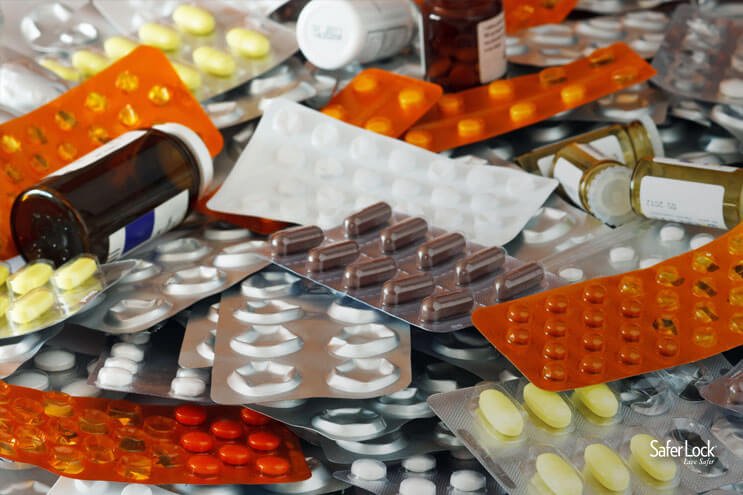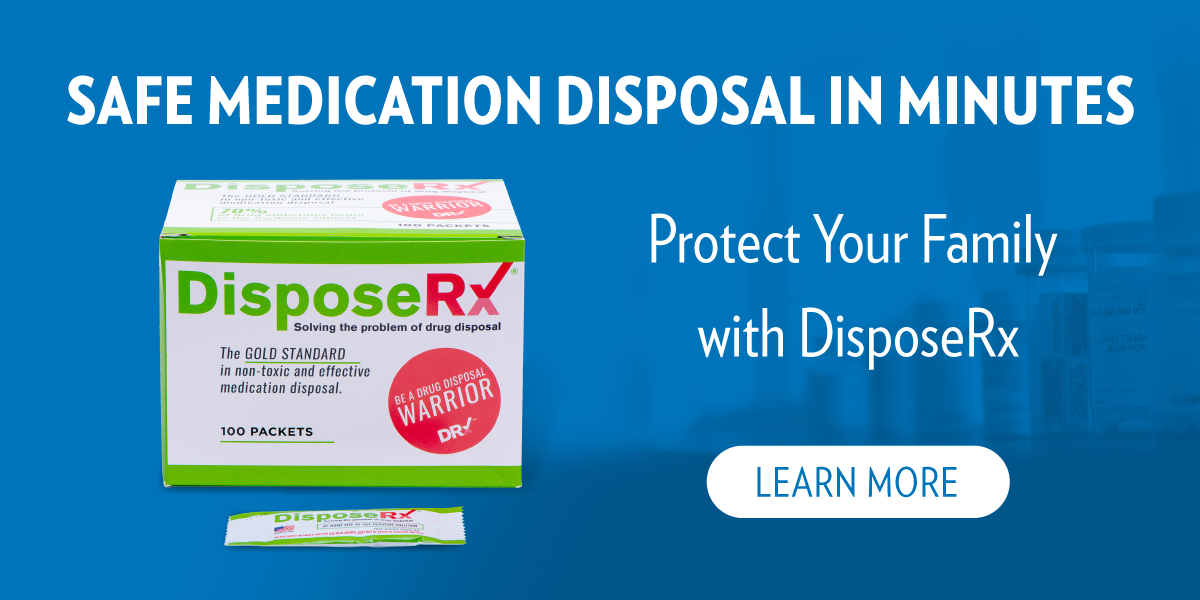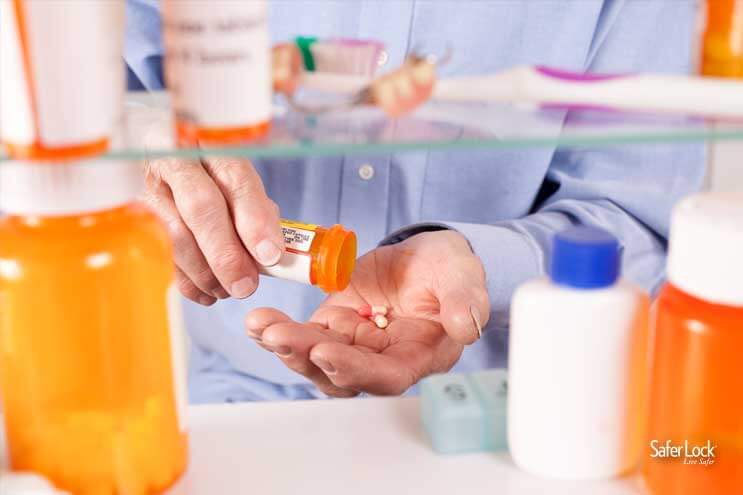Do you have medications in your home? If you answered “yes,” you’re not alone. 82% of American adults take at least one medication, according to the Centers for Disease Control and Prevention (CDC). 29% of American adults take five or more medications - making medication safety an important topic for most households.
Each year in the United States, adverse drug events - harm resulting from medication use - cause more than one million visits to hospital emergency departments. (One quarter of these patients need to be hospitalized for further treatment.) An estimated 71,000 children are seen in emergency departments each year because of unintentional medication poisonings - most because a child found and consumed medication without adult supervision.
Medicines are generally safe when used as prescribed or directed on the label, but there are risks involved when taking any medication. Adverse drug events are an important patient safety problem.
One easy way to prevent adverse drug events in your home is to have a thorough conversation with your physician before you start a new prescription. ConsumerSafety.org recommends asking your medical care provider the following questions before starting a new medication:
Medication Usage Questions
How will this Medication Help Me?
If the medication is for a new diagnosis, make sure you understand what the condition is and how it affects you. Asking how a medicine works can help you understand what’s going on in your body and provide you with a clear vision of how the medicine will help.
How is the Medication Taken?
Some medications may make you drowsy and are best taken at night. Others may disagree with an empty stomach and need to be taken with a meal to avoid unpleasant side effects. How a medication is taken is a very important question to ask to avoid adverse effects.
Why THIS Medication?
Your doctor may have reasons why he/she choose a particular medication. A new one may have fewer side effects than an older solution; conversely, an older drug may have more credibility and trials to demonstrate effectiveness compared to a drug that’s brand new on the market. Different medications may have different risks or may interact with your existing prescriptions; your personal health history and other medications can affect the choice, as well.
Adverse Reaction Questions
What Side Effects Should I Expect?
Side effects can have a huge range in terms of probability or severity. Some medications may have a high probability of low-risk side effects, such as antibiotics. Antibiotics are responsible for almost one out of five emergency room visits; antibiotics have a higher than average risk of an adverse drug event due to allergic reactions. Other medications can have a low probability of severe side effects. One example is anticoagulant “blood thinner” medications, such as Xarelto. This medication is often prescribed to lower the risk of stroke caused by blood clots. But it’s been linked to severe side effects such as uncontrollable internal bleeding, which can be fatal. Make sure your doctor walks you through all possible side effects, the possibilities of them occurring, and what to do if you experience one.
What Should I Avoid When Taking This Medication?
Alcohol, over-the-counter medicines like acetaminophen and cough and cold medications, and NSAIDS like ibuprofen and aspirin could lead to risky interactions with your medication. Some medicines can even react to food. Be sure you understand what you need to avoid when taking a medication to avoid an adverse event.
Will this Interact with Other Medications?
Be sure you’ve discussed all other medications - prescription and over-the-counter - that you’re currently taking and understand the potential for interactions. One drug could affect how another drug works or could lead to a potentially harmful interaction. This is very important if you are seeing more than one health care provider. Always discuss possible interactions before starting a new medication.
Situational Questions
For Women: Is this Medication Safe When Pregnant or Nursing?
Not all medications have been tested for safety during pregnancy or for nursing mothers. Some medications can cross the placenta and harm the fetus itself. Others can put mom at risk during a pregnancy. One example is Tetracycline, an antibiotic that should never be used by pregnant women because it can cause bone issues in mothers and may result in fetal malformations.
What if I Miss a Dose?
For some medications, missing a dose can lower its effectiveness. For example, missing a dose of some birth control pills can increase the risk of pregnancy and a backup birth control method may be needed. Each medication is different. For some, a missed dose can be taken with the next dose (a double dose). For others, a double dose can lead to unpleasant side effects or an adverse event and should be avoided.
Is this Medication Addictive?
Some medications have the potential for abuse. Some of the broad classes of medications that are most prone to non-medical use or abuse are opiate analgesics painkillers such as oxycodone (Oxycontin), sedative-hypnotics sleep aids such as zolpidem (Ambien), anti-anxiety sedative-anxiolytics such as alprazolam (Xanax), and stimulants such as dextroamphetamine (Adderall) and methylphenidate (Ritalin). It’s important to understand the abuse potential of your medication, not only for your own safety, but for the safety of your family. 6.5 million Americans have reported non-medical use of prescription drugs. Most teens who have reported non-medical use of prescription medications say they got them free from a friend or family member.
How to Prevent Adverse Events at Home
Once you have a solid understanding of your new medication - what it does, how it works, potential side effects, interactions, and abuse potential - follow these tips to prevent adverse events in your home:
Take Medication Only as Prescribed
Only take medications that have been prescribed to you by your healthcare provider and follow the instructions for usage. Don’t skip doses, double dose, or mix with other medications (prescription or over-the-counter) without discussing possible interactions with your prescribing physician. Look carefully at the bottle before you take a medication, be sure you’re taking the right one at the right time.
Keep a Medication List
Write down what you’re taking and keep the list up-to-date. Your list should include why you’re taking each medication, the dosage, and how often you take it. Keep a copy with you or at home, and give another to a loved one or caregiver. Take your list when you visit a health care provider and review your medications at each visit.
Store Medications Properly and Securely
Most medications need to be stored in a dry place at room temperature, away from direct sunlight. Some medications need to be refrigerated to keep their active ingredients working. The bathroom, where many people keep medications in a medicine cabinet, is often the worst place to store medicines - the environment can become overly moist from sinks, shower and bathtub use.
Some medications have a higher risk for abuse, addiction, or severe adverse events than others. Opioid painkillers, for example, are the most common prescription drugs involved in prescription drug overdose deaths. And it’s not just adults at risk. The Centers for Disease Control and Prevention (CDC) reports that 87 young children died of opioid intoxication in 2015, up from just 16 in 1999.
All prescription medications should be stored up and away from children, out of sight and out of reach. But powerful medications with a higher risk for addiction or poisoning need an extra layer of security. Secure prescription painkillers and other high-risk medications in a medication lock box or with a combination locking cap designed to prevent unauthorized use and accidental poisoning.
Dispose of Medications Promptly
If you have unused prescriptions at the end of your treatment, don’t keep them around for a rainy day. Many medications lose their effectiveness over time, and using an old, expired prescription could lead to an adverse event. Keeping unneeded, high-risk medications in the home only adds to the risk of an accidental poisoning or adverse event. Many pharmacies and communities have Medication Take Back programs and events to help you dispose of unwanted medications.
If you can’t find a medication disposal program or event near you, most medications can be disposed of in the household trash.
- Do: mix medicines in an unpalatable substance such as dirt, kitty litter, or coffee grounds
- Do: Place the mixture in a sealed container and dispose of in household trash
- Don’t: Flush medications down the toilet - keep meds from entering waterways
Have an Emergency Plan
Understand the potential side effects and adverse reactions that could come from your prescriptions so you can recognize them in yourself - or in someone else in your household who may inadvertently take your prescription by mistake.
Poison Control Phone Number: (800) 222 -1222
Program the poison control hotline number into all mobile phones. If you have young children in the home, leave the number written down in a visible location for babysitters or other caregivers to find when you’re not home. Call poison control immediately if you suspect your child has accidentally taken a pill from grandma’s purse, found a prescription medication on the ground, bedside table, purse or bag, taken too much of a prescription medication, or taken a medication not prescribed for them.
If you suspect an accidental medication poisoning, act fast.
Prescription medications can help with many different medical conditions and symptoms. But they can also lead to harmful adverse reactions - some of which can be fatal. Be sure you understand all of the risks that come along with your medication, and then practice safe medication practices to ensure that your medication is taken only by the right person, in the right amounts, at the right time.




